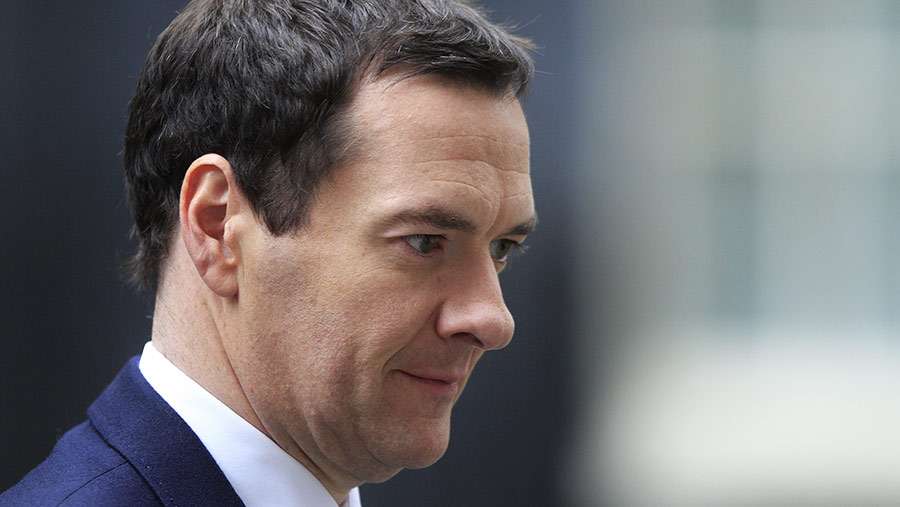Autumn Statement: What chancellor’s changes mean for farmers
 George Osborne ©Steve Bell/Rex Shutterstock
George Osborne ©Steve Bell/Rex Shutterstock The chancellor’s Autumn Statement, delivered today (25 November), looks like a mixed bag for farmers, with more detail needed, say advisers.
“There were no positive or negative changes for wholly trading farming businesses announced in the autumn statement, said Peter Griffiths, tax director at Hazelwoods.
“However, as usual the detail will need to be analysed to confirm there is nothing in the small print.”
Sam Kirkham, partner at Albert Goodman, added: “The budget so far seems pretty uneventful for farmers, but a big hit to those farmers who have second homes and buy-to-lets, which come on top of the announcements earlier this year to restrict higher rate tax relief on mortgage interest on buy-to-lets.”
The main changes affecting farming businesses and their families are:
Stamp duty land tax increased
- Stamp duty land tax (SDLT) will be increased to 3% above current rates for buyers of second homes or buy-to-lets. Mr Kirkham said advisers would be looking to see if exemptions for farmworker cottages would be made, while Steven Rudd, partner at Larking Gowen, warned SDLT payment deadlines could be reduced from 30 days to 14 days.
Capital gains tax to be paid more quickly
- From April 2019 capital gains tax will need to be paid within 30 days of selling a residential property. Ms Kirkham said: “Given farmers’ cashflow and the possibility of needing to sell and let assets to support the business, this is not good news.” David Missen, head of agriculture at MHA, said it would slow down transactions and cause “considerable friction between buyer and seller”.
Tax credits not to be cut
- In a huge U-turn, tax credits will not be abolished immediately but be phased out, with universal tax credits taking over. Gail Soutar, NFU chief economic adviser, said this would “help many farming families who are experiencing falling incomes”.
Small business rates relief
- The small business rate relief scheme will be extended for another year.
Farmer averaging to be extended
- Farmer averaging will be extended from two years to five from April 2016 (a confirmation from the summer budget), with farmers able to choose which they opt for. Carlton Collister at LandTax LLP, said this was “good news as although five year averaging may be attractive to some, for most two year averaging is simpler and cheaper for their accountants to calculate.”
Changes to tax reporting for the self-employed
- Most self-employed people will have to update HMRC on their tax affairs quarterly from 2016 via a digital account. Mr Missen said: “This presupposes that everyone has working broadband. There will also be a consultation on aligning – which will mean accelerating – tax payment dates to bring them closer to when profits arise. Again this seems unlikely to help cut bureaucracy in the farm office.”
More building and infrastructure in the countryside
- The countryside is likely to see more building with the announcement of HS2 “the largest road investment plan since the 1970s”, and the construction of 400,000 new homes by 2020. This could be good news for young farmers looking to buy their first home, but landowners may face more compulsory purchases.
CLA president Ross Murray said: “It is vitally important that these policies deliver for rural communities who are in desperate need of new homes. We will continue to work closely with government to ensure the direct investments and planning reforms work for rural people.”
Corporation tax rate in Northern Ireland cut
- Corporation tax rate in Northern Ireland will be cut from 20% to 12.5%. Sean McCann, financial planner at NFU Mutual, said it may make it worthwhile for Northern Ireland farmers to consider the structure of their businesses.
Lack of commitment on broadband
- There was no commitment to invest in broadband, but a promise to “explore” setting up a new “broadband investment fund”. The NFU said it was “disappointed that there was no mention of how farmers, many of whom are among the 5% who struggle with broadband access, will benefit from improved broadband facilities.”
State pension increased
- The basic state pension will be increased to £119.30/week, with the new single-tier pension of £155.65/week.
More apprentice places created
- An “apprenticeship levy” of 0.5% of an employer’s pay bill will be introduced. However this will only effect employers with a wage bill in excess of £3m. The money raised will be used to create 3m apprenticeships.
